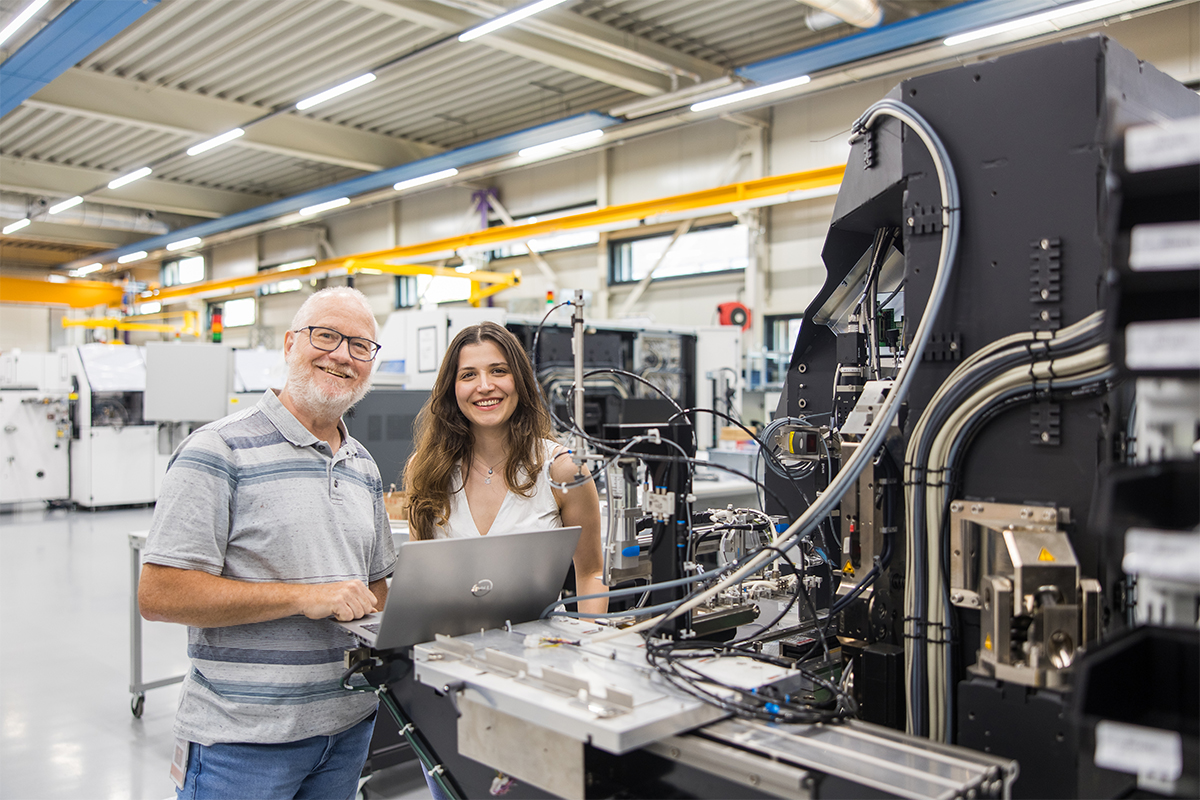Written by: Laura van der Burgt
When senior software architect Maurice Beelen joined Sioux Technologies in 1997, he quickly got to know all his colleagues – who were all Dutch-speaking at the time. When Turkish software designer Alara Yilmaz joined Maurice’s team in 2024, she was welcomed by a Belgian, a Hungarian, an Austrian, a Pakistani, two Germans, and three Dutch colleagues. All those different nationalities and generations make their team stronger, they believe. ‘Everyone can show the best of themselves.’
‘For a long time, the rule was that the whole company had to fit into one bus,’ says Maurice Beelen, referring to a principle held by Sioux Technologies founder Hans Duisters regarding company size. ‘That bus has now become an airbus,’ he laughs. Maurice became acquainted with Sioux through his previous employer, Océ, where he worked on a project with Peter van Knippenberg (one of Sioux’s first employees). ‘Peter often talked about the warm, family-like atmosphere at Sioux. Eventually, I asked, ‘Can I come in for a chat?’ The rest is history.’
Compulsory lessons with the nuns
For the first ten years of Maurice’s career, all his colleagues were Dutch. ‘In 2006, I had my very first foreign colleague, from Belarus. At the time, all expats were required to learn Dutch, often attending classes with ‘the nuns in Vught’. We believed that switching to English would hinder their integration with clients.’
That language helps with integration is something Alara Yilmaz, his Turkish colleague who was recruited by a headhunter, agrees with. But in today’s Netherlands, she says English is a fully accepted second language. ‘I practice a lot with Duolingo, so I can speak a bit of Dutch when I go to the market or a restaurant, for example. But it’s not really necessary. When I first moved here, my elderly neighbour explained to me in perfect English where to dispose of my paper recycling. Even children speak good English here – I’ve really noticed that.’
Different ways of communicating
Linguistically, the seven nationalities in Alara and Maurice’s team understand each other well, but there are certainly cultural differences in communication styles. They both find that talking openly about this is enriching. ‘When I did my first code review, I politely suggested an alternative approach,’ Alara explains. ‘In Turkey, being polite is very important.’
‘After a while, a colleague told me, ‘You don’t have to be that nice. Just say what’s wrong and how to fix it.’ Since then, I’ve become more direct.’
Spontaneous or planned
That Dutch straightforwardness isn’t always adopted in every situation. ‘When we’re in Austria for a project, we always rent one or more apartments together,’ Maurice explains. ‘I want to make good use of my free time there, so at first, I came up with all sorts of plans. But my colleagues barely responded. When I asked why, it turned out it wasn’t about me or my ideas - they just didn’t want their schedules to be completely booked. All that planning is typically Dutch; my colleagues prefer a bit of freedom.’
Alara agrees. ‘I also had to learn that in the Netherlands, you don’t just spontaneously drop by a friend’s house for coffee. You have to make an appointment.’
Mash with halal smoked sausage
One fun way the team members get to know each other’s cultures better is by cooking for one another. ‘When we’re in Austria, we often cook traditional dishes,’ says Alara. ‘Maurice loves my Karniyarik, a Turkish dish with minced meat, aubergine, and tomato sauce. I did have to learn that when Dutch people say they’ve had ‘enough’, they really mean it. In my culture, we keep encouraging people to eat some more. But with Dutch people, that’s not necessary.’
In return, Maurice cooked a traditional Dutch stamppot with colleague Dirk Coppelmans. ‘We served all the ingredients separately so everyone could choose what to eat – not everyone eats fried bacon bits, for example. After some searching, we even found halal smoked sausage.’
Age differences as enrichment
The age differences in Maurice and Alara’s team are also seen as an asset. ‘What I admire about my more ‘senior’ colleagues – is it all right if I put it that way, Maurice? – is that they remain open to innovation. If you’ve been in this business for nearly thirty years, you’ve seen a lot of changes come and go. That experience is incredibly valuable. Young people tend to make decisions quickly out of ambition; seniors take time to consider all options and consequences. That improves decision-making and leads to better outcomes.’
Fresh and flexible
Maurice agrees with his younger colleague. ‘One of Sioux’s strengths is that you don’t get stuck in a rut here, because you change projects every few years. That keeps you fresh and flexible. But thanks to my seniority – which you phrased very nicely, Alara – I now approach my work more calmly than I used to. That sense of calm definitely has value. I think we’re very successful in leveraging the diversity within our team. We’re always attuned to one another, which allows everyone to show the best of themselves.’
